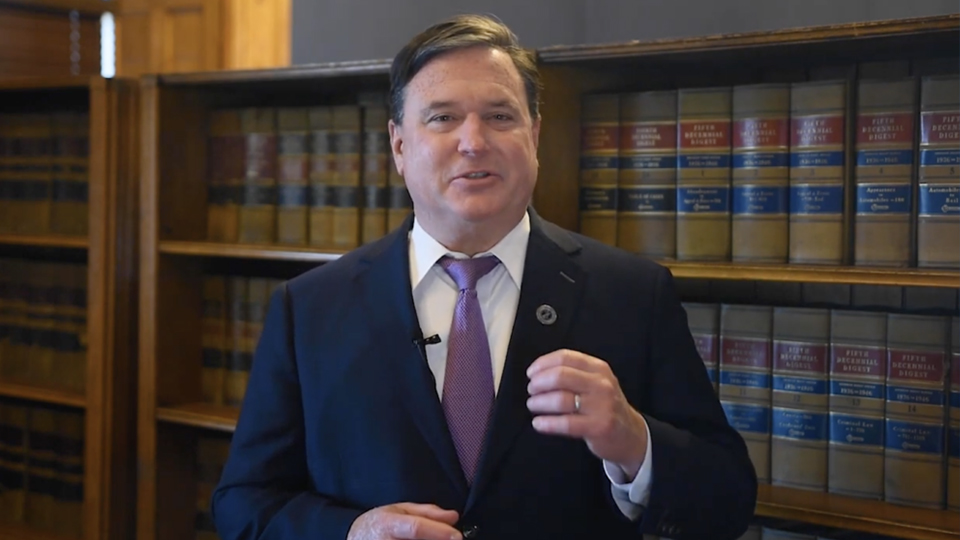Health entities providing gender-affirming care seek to quash AG’s request
Subscriber Benefit
As a subscriber you can listen to articles at work, in the car, or while you work out. Subscribe Now
Three health care entities urged a Marion County judge to quash civil investigative demands from Attorney General Todd Rokita Tuesday, part of an ongoing battle over gender-affirming care.
Marion County Judge Gary Miller said he would decide over the next 48 hours how to proceed with the request after a brief hearing Tuesday in which the plaintiff health care providers said Rokita’s office already had relevant information in another case.
“… there’s no reason we should be here; that’s really what the issue is. If they want this information … most of it they already have,” said Joshua Minkler, an attorney for Indiana University Health. “When they’ve asked for things (in that case), we’ve provided it.”
Minkler referred to another ongoing dispute, K.C. vs. The Individual Members of the Medical Licensing Board of Indiana, in which a handful of transgender minors challenged a state ban on gender-affirming care in federal court. He said that the extensive discovery documents in that case, overseen by U.S. District Court Judge James Patrick Hanlon, contained the information requested.
But attorneys with Rokita’s office disagreed, saying those documents hadn’t satisfied the request, especially related to advertising materials on gender-affirming care from those entities. Rokita’s office is proceeding under the Deceptive Consumer Sales Act.
“None of that is part of the K.C. litigation… amounts of revenue generated (from gender-affirming care procedures) was not part of the K.C. litigation (nor) visits to schools or other communications — by phone, email or otherwise — and a lot of the questions where we do have responses in the K.C. litigation may or may not be complete responses,” said Steven Taterka, with the AG’s office.
“If we already had the facts, we wouldn’t need to get the facts … we could go ahead and file an enforcement action,” Taterka continued. “We issued a (Civil Investigative Demand) because we don’t want to go running off to the courthouse filing something frivolous.”
Taterka and fellow attorney Jacob Murray are both part of the Consumer Protection Division of the AG’s office and not under the Solicitor General, which is handling the federal constitutional case.
Investigation based on advertising, questionable articles
In March, as legislators wrestled with a proposed ban on health care for transgender youth Rokita sent letters to several Indiana facilities demanding more information.
Much of Taterka’s comments during the hearing seemed to point toward the office building a case accusing the health care entities of violating consumer protections in advertising materials or coercing parents to sign off on such treatments. Letters to the providers ask about their use of suicide rates for untreated gender dysphoria and the risk of sterilization and “abnormal brain development.”
Lawmakers eventually passed a ban — a defeat for parental rights — but an order from Hanlon struck the majority of the ban down, leaving only the ban on surgical interventions for minors. Providers said such procedures didn’t occur and lengthy committee testimony failed to produce any Hoosier minors who obtained surgical care.
Just three providers responded to Rokita’s initial letter, prompting his office to pursue legal action in the form of civil investigative demands in July — the topic of Tuesday’s hearing.
“I’ve yet to hear and still wonder why the list of items that they want — advertising materials, marketing materials — can’t go to the forum where we already are,” Minkler said.
In response, Murray said the advertising materials might not “be relevant to a constitutional challenge case. That’s why we have this separate matter.”
Kim Metzger, attorney for plaintiff Eskenazi Health, said there was no such basis for an investigation in the first place, much less a civil investigative demand, but left the issue up for Miller’s decision.
“The investigation is… entirely based on what appears to be two popular press articles about ‘detransitioning’ — which is not a term I care for but the term that’s used in the articles. Does that form a legitimate basis for an investigation?” she asked.
IU Health, Eskenazi Health and final plaintiff Mosaic Health and Healing Arts are all part of the K.C. court case, as some of the few health care providers to oversee gender-affirming care in the state. That case has open discovery until March 2024, as shared in the hearing.
The Indiana Capital Chronicle is an independent, not-for-profit news organization that covers state government, policy and elections.
